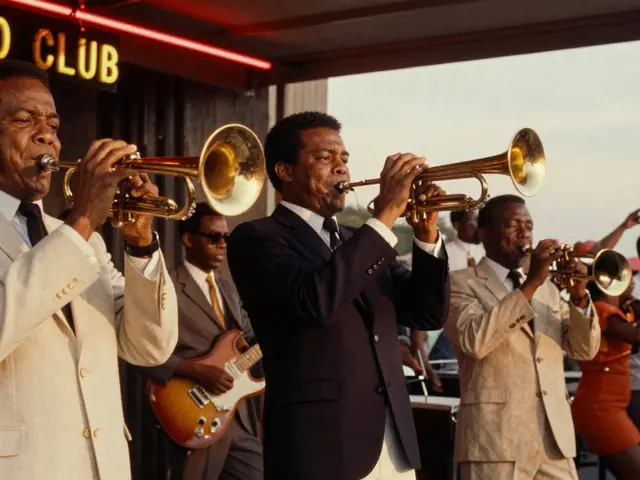Classical music is often seen as an archaic or highbrow genre, yet it holds immense power that can affect our lives positively in various ways. From enhancing cognitive functions to alleviating stress, the benefits are rooted deeply in our biology and psychology. Read on to discover just how this timeless genre can become a valuable part of your life.
- The Mind and Classical Music
- Boosting Productivity Through Harmonies
- Emotional Connection and Healing
- Implementation in Daily Life
- Exploring Iconic Composers
The Mind and Classical Music
Classical music isn't just a background soundtrack for high-end venues or an acquired taste for the elite. Scientists have found that it can influence the human mind in profound and beneficial ways. The structures of classical compositions trigger the brain in unique manners, sparking neural connections that enhance cognitive abilities. Consider the 'Mozart effect,' a popular theory suggesting that listening to Mozart could temporarily boost one's IQ and spatial-temporal reasoning skills.
Listening to classical music can improve focus and concentration, making it an excellent companion for studying or working on complex tasks. When you listen to pieces by composers like Bach or Beethoven, a calmness can take over, allowing for clarity of thought. Studies have shown that students who listen to classical music while studying often achieve higher test scores, thanks to an increased ability to retain information and an overall reduction in stress levels.
Additionally, music with a tempo of around 60 beats per minute, such as many Baroque era pieces, has been found to synchronize with the listener's heart rate, leading to a state of relaxed alertness. This can be particularly beneficial for those dealing with anxiety or stress. In a study by the University of London, participants exposed to classical music showed significantly lower levels of cortisol, the stress hormone, compared to those who weren't exposed to music at all.
French research scientist Dr. Alfred Tomatis believed that listening to classical music could enhance language skills, creativity and even heal the brain. Tomatis used music therapy in treating patients with dyslexia and autism with notable success. Similarly, the rhythm and melodies help in nurturing a more innovative and imaginative mind. Hence, it's no surprise that many of history's greatest minds, including Albert Einstein, were avid fans of classical music.
"Music can change the world because it can change people." – Bono
Moreover, classical music can also play a therapeutic role in mental health. For patients suffering from depression, anxiety, or PTSD, engaging with music therapy sessions that incorporate classical pieces can be part of an effective treatment plan. The music provides an emotional outlet and helps in regulating moods, offering solace and a peaceful mental retreat.
Another interesting facet about classical music is its complex structure, which can improve brain function over time. Dmitri Shostakovich's symphonies or the intricate compositions of Vivaldi challenge the brain, keeping it engaged and mentally agile. This exercise is akin to solving puzzles or learning new languages, activities that are often recommended to keep the mind sharp as we age. Hence, regular listening can be a delightful way to maintain and enhance mental acuity.
Boosting Productivity Through Harmonies
In our fast-paced modern world, maintaining focus and efficiency can often feel like an uphill battle. Interestingly, classical music can be an unlikely ally in boosting productivity. Research has shown that playing classical music in the background while working could help improve concentration and foster a more stable mental environment. The rhythmic, structured form of classical music aids in blocking out distracting noises, providing a steady yet unobtrusive perceptual backdrop.
Renowned studies such as the Mozart Effect have suggested that listening to Mozart's compositions can enhance spatial-temporal reasoning, which are skills important in fields like mathematics and engineering. Though some debate the extent of this effect, there is a wealth of independent studies and anecdotal evidence that indicates some types of classical music can indeed be beneficial for work and study.
Baroque music, with its steady 60 beats per minute, is particularly noted for its impact on productivity. This genre creates a calming ambiance that can reduce stress and anxiety levels, helping you to focus on the task at hand. Pieces by composers such as Johann Sebastian Bach and Georg Philipp Telemann are examples of music that could potentially boost work efficiency.
"Listening to classical music might improve your attention span and your memory," says Dr. Masha Godkin, a professor at Northcentral University.
Implementing classical music into your daily working routine doesn’t have to be complicated. Here’s a simple step-by-step approach:
- Choose a playlist that is composed of classical pieces known for enhancing focus. Start with well-known selections from Baroque composers.
- Play the music at a low volume. The goal is to create a background ambiance, not to drown out all other sounds.
- Assess your productivity levels before and after incorporating classical music to measure its impact.
For those who might not be accustomed to classical music, apps like Spotify and Apple Music offer curated playlists specifically designed for focus and productivity. These can be a great starting point and may introduce you to new pieces that align with your work habits.
By making classical music a part of your work environment, you're leveraging a tool used by many successful figures throughout history. From Albert Einstein who often listened to Mozart and Bach, to modern tech offices that play classical music to aid employee productivity, there's something genuinely powerful to be tapped into here. Give it a try, and you might find that these timeless harmonies are just what you need to take your productivity to the next level.

Emotional Connection and Healing
Classical music has a unique ability to touch the deepest parts of the human soul. The emotional connection it forges can be incredibly powerful, offering solace, inspiration, and even healing. This profound effect is largely due to the intricate melodies and harmonies that characterize the genre, capable of stirring profound emotions and memories within us. For instance, certain pieces by composers like Beethoven and Chopin are renowned for their ability to evoke a range of feelings from joy to melancholy.
Scientific research supports these experiences, revealing that listening to classical music can lead to the release of neurotransmitters like dopamine, which play a role in our emotional wellbeing. According to a study from the University of Helsinki, music therapy has shown significant potential for alleviating symptoms of depression and anxiety. The research highlights that the structured yet diverse nature of classical compositions helps to harmonize brain activity, leading to feelings of calm and relaxation.
Beyond the clinical benefits, there are countless personal anecdotes that underline the healing power of classical music. A mother once shared how playing Mozart's Requiem in D minor helped her find peace during a period of mourning. The intricate arrangements of violins and choir seemed to resonate with her grief, offering a sense of companionship and understanding that words alone could not provide. This transformative aspect of classical music can support people through challenging times, helping them to process complex emotions.
The genre’s capability to aid emotional healing is also utilized in various healthcare settings. In hospitals, for instance, classical music is often played in waiting rooms and during treatments to create a soothing environment. This practice is not just anecdotal; a study published in the Journal of Advanced Nursing found that patients recovering from surgery experienced less pain and used fewer pain medications when exposed to classical music. This tangible benefit is a testament to music’s profound impact on the human body and mind.
Classical music’s versatility in evoking and managing emotions is also useful in everyday life. From calming nerves before a big presentation to unwinding after a hectic day, incorporating classical pieces into daily routines can make a noticeable difference in emotional balance. Pieces such as Bach’s Cello Suites or Debussy’s Clair de Lune are excellent choices for creating an atmosphere of tranquility and reflection.
"Music can change the world because it can change people." – Bono
The next time you're feeling overwhelmed or in need of a mental balm, try turning to classical music as a therapeutic tool. Create a playlist of your favorite calming pieces, find a comfortable space, and allow the melodies to wash over you. You might find that this simple practice transforms your emotional landscape, providing relief, clarity, and a renewed sense of peace.
Implementation in Daily Life
Integrating classical music into your daily routine can transform your lifestyle in ways you never imagined. One of the simplest methods is to start your day with a playlist of your favorite classical pieces. Morning is a time when our minds are fresh and receptive, and the harmonic tones can set a peaceful tone for the day. Whether you prefer the serene strings of Vivaldi or the tranquil piano compositions by Chopin, these soothing sounds can help ease you into a productive state.
Workspaces are another fantastic arena for classical music. Research shows that listening to classical music can improve concentration and productivity. Consider playing some Bach or Mozart while working on intensive tasks. The complex structures and patterns in these compositions can aid in better mental organization and focus. According to a study published in the journal 'Learning and Individual Differences,' students who listened to classical music during study sessions performed better on tests compared to those who didn't.
Even if you're not a classical music aficionado, you can still enjoy its benefits by incorporating it into your relaxation or meditation routines. The slow-tempo compositions encourage a slower heartbeat, which can help lower stress levels. Using classical music as a backdrop for yoga or mindfulness exercises can create a more immersive experience. The calming effect of music by composers like Debussy or Schumann can deepen your state of relaxation.
When implementing classical music into family activities, consider background scores during meals. This can cultivate a serene dining environment, making mealtime more enjoyable and promoting better digestion. Many families have noticed a significant change in their meal times when accompanied by the gentle sounds of classical music, which can make conversations more enjoyable and less rushed.
Classroom Integration
For those in the education field, classical music can be a powerful tool. Playing it during lectures or study periods can create a calm learning atmosphere. Teachers have reported that students tend to be more focused and calm when classical music is playing in the background. This method isn’t just for young children; it works well with older students, too. Incorporating periods of music listening where students analyze the compositions can also foster a deeper appreciation for the arts.
“Classical music is the best antidote against the chaos and stress of modern life.” — Albert Einstein
Lastly, classical music can be a fantastic addition to your bedtime routine. Listening to compositions by Beethoven or Brahms before sleep can improve sleep quality. The slow rhythms and soft dynamics can help you unwind, creating an optimal state for falling asleep. This practice is beneficial for both adults and children, encouraging healthier sleep patterns and overall better rest.
Exploring Iconic Composers
Classical music's rich tapestry has been woven by some of the most brilliant minds in the history of humankind. Let's delve into the lives and works of a few legendary composers whose music has withstood the test of time and continues to inspire.
When speaking of classical music, one cannot begin without mentioning Ludwig van Beethoven. Born in 1770 in Bonn, Germany, Beethoven's compositions are a triumph over adversity. Despite losing his hearing, he composed masterpieces like the Ninth Symphony and 'Für Elise,' which remain pivotal in the world of music. His ability to convey profound emotion through complex arrangements is unparalleled.
Another towering figure is Wolfgang Amadeus Mozart. Born in Salzburg in 1756, Mozart was a child prodigy who composed over 600 works that span various genres, including symphonic, operatic, and chamber music. Mozart’s 'Requiem' and 'The Magic Flute' are timeless pieces that showcase his genius. His unparalleled versatility and mastery of diverse musical forms have left a lasting legacy.
Johann Sebastian Bach, born in 1685, is often hailed as the father of Western classical music. His pioneering work in counterpoint and harmony has influenced countless composers after him. Bach's compositions such as 'Brandenburg Concertos' and 'The Well-Tempered Clavier' are considered cornerstones of classical music. His intricate fugues and chorales remain a substantial part of musical education globally.
Frédéric Chopin, the Polish piano virtuoso born in 1810, revolutionized the instrument with his innovative techniques and deeply emotional compositions. Chopin’s pieces such as 'Nocturnes' and 'Études' are integral to piano repertoire and are celebrated for their technical difficulty and expressive depth. His influence on piano music is immense and continues to resonate with pianists and audiences alike.
Equally notable is Pyotr Ilyich Tchaikovsky, the Russian composer born in 1840, whose works include some of the most famous ballets like 'Swan Lake,' 'The Nutcracker,' and 'Sleeping Beauty.' Tchaikovsky's ability to blend Russian folk music with Western classical traditions created an evocative and unique style that commands admiration worldwide.
Influence and Legacy
The contributions of these composers go beyond mere entertainment; they have shaped the cultural and artistic landscapes of their times and continue to influence contemporary music. The works of these geniuses not only remain concert staples, but they also find new life in film scores, modern interpretations, and even video games.
Their lives and stories are as captivating as their compositions. Beethoven’s struggle with deafness, Mozart's prolific output despite a short life, Bach’s masterful fugues, Chopin's delicate yet powerful piano pieces, and Tchaikovsky’s emotionally compelling ballets bring a human element to their genius that is both relatable and inspirational.
As the legendary violinist Itzhak Perlman once said, “The greatest respect an artist can pay to music is to give it life.”






